|
|
|
Sort Order |
|
|
|
Items / Page
|
|
|
|
|
|
|
| Srl | Item |
| 1 |
ID:
107532


|
|
|
|
|
| Publication |
2011.
|
| Summary/Abstract |
Several prominent human rights treaties seek to minimize violations during emergencies by authorizing states to "derogate"-that is, to suspend certain civil and political liberties-in response to crises. The drafters of these treaties envisioned that international restrictions on derogations, together with international notification and monitoring mechanisms, would limit rights suspensions during emergencies. This article analyzes the behavior of derogating countries using new global data sets of derogations and states of emergency from 1976 to 2007. We argue that derogations are a rational response to domestic political uncertainty. They enable governments facing serious threats to buy time and legal breathing space from voters, courts, and interest groups to confront crises while signaling to these audiences that rights deviations are temporary and lawful. Our findings have implications for studies of treaty design and flexibility mechanisms, and compliance with international human rights agreements.
|
|
|
|
|
|
|
|
|
|
|
|
|
|
|
|
| 2 |
ID:
176048
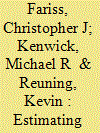

|
|
|
|
|
| Summary/Abstract |
Counting repressive events is difficult because state leaders have an incentive to conceal actions of their subordinates and destroy evidence of abuse. In this article, we extend existing latent variable modeling techniques in the study of repression to account for the uncertainty inherent in count data generated for this type of difficult-to-observe event. We demonstrate the utility of the model by focusing on a dataset that defines ‘one-sided-killing’ as government-caused deaths of non-combatants. In addition to generating more precise estimates of latent repression levels, the model also estimates the probability that a state engaged in one-sided-killing and the predictive distribution of deaths for each country-year in the dataset. These new event-based, count estimates will be useful for researchers interested in this type of data but skeptical of the comparability of such events across countries and over time. Our modeling framework also provides a principled method for inferring unobserved count variables based on conceptually related categorical information.
|
|
|
|
|
|
|
|
|
|
|
|
|
|
|
|
| 3 |
ID:
176037
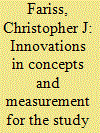

|
|
|
|
|
| Summary/Abstract |
The observation, measurement, and analysis of violent and contentious processes are essential parts of the scientific study of peace and conflict. However, concepts such as the level of repression, the number of individuals killed during a civil war, or the perception of members of an out-group, are often by definition difficult to observe directly. This is because governments, non-state groups, NGOs, international organizations, monitoring organizations, and other actors are not incentivized to make information about their actions systematically observable to analysts. In this context, latent variable models can play a valuable role by aggregating various behavioral indicators and signals together to help measure latent concepts of interest that would not otherwise be directly observable. Each of the articles in this special issue uses some form of a latent variable model or related measurement model to bring together observable pieces of information and estimate a set of values for the underlying theoretical concept of interest. Each of the articles pays special attention to the processes that make the observation of peace and conflict processes so challenging. As we highlight throughout this introductory article, the unifying framework we present in this special issue is validation. Though the substantive content of each of the articles in this special issue varies, they represent the diversity of substantive interests that span the study of peace and conflict, broadly conceived. Overall, we hope that the special issue becomes a standard reference for scholars interested in developing and validating new measurement models for the study of peace and conflict.
|
|
|
|
|
|
|
|
|
|
|
|
|
|
|
|
| 4 |
ID:
134459


|
|
|
|
|
| Summary/Abstract |
This study explores the relationships between state violations of different human rights. Though most quantitative studies in international relations treat different types of repressive behaviors as either independent or arising from the same underlying process, significant insights are gained by conceptualizing different human rights violations as separate but dependent processes. We present a theoretical framework for conceptualizing the mechanisms relating human rights practices and produce a novel measurement strategy based on network analysis for exploring these relationships. We illustrate high levels of complementarity between most human rights practices. Substitution effects, in contrast, are occasionally substantial but relatively rare. Finally, using empirically informed Monte Carlo analyses, we present predictions regarding likely sequences of rights violations resulting in extreme violations of different physical integrity rights.
|
|
|
|
|
|
|
|
|
|
|
|
|
|
|
|
| 5 |
ID:
185676


|
|
|
|
|
| Summary/Abstract |
Gross domestic product (GDP), GDP per capita, and population are central to the study of politics and economics broadly, and conflict processes in particular. Despite the prominence of these variables in empirical research, existing data lack historical coverage and are assumed to be measured without error. We develop a latent variable modeling framework that expands data coverage (1500 AD–2018 AD) and, by making use of multiple indicators for each variable, provides a principled framework to estimate uncertainty for values for all country-year variables relative to one another. Expanded temporal coverage of estimates provides new insights about the relationship between development and democracy, conflict, repression, and health. We also demonstrate how to incorporate uncertainty in observational models. Results show that the relationship between repression and development is weaker than models that do not incorporate uncertainty suggest. Future extensions of the latent variable model can address other forms of systematic measurement error with new data, new measurement theory, or both.
|
|
|
|
|
|
|
|
|
|
|
|
|
|
|
|
| 6 |
ID:
133022
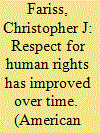

|
|
|
|
|
| Publication |
2014.
|
| Summary/Abstract |
According to indicators of political repression currently used by scholars, human rights practices have not improved over the past 35 years, despite the spread of human rights norms, better monitoring, and the increasing prevalence of electoral democracy. I argue that this empirical pattern is not an indication of stagnating human rights practices. Instead, it reflects a systematic change in the way monitors, like Amnesty International and the U.S. State Department, encounter and interpret information about abuses. The standard of accountability used to assess state behaviors becomes more stringent as monitors look harder for abuse, look in more places for abuse, and classify more acts as abuse. In this article, I present a new, theoretically informed measurement model, which generates unbiased estimates of repression using existing data. I then show that respect for human rights has improved over time and that the relationship between human rights respect and ratification of the UN Convention Against Torture is positive, which contradicts findings from existing research.
|
|
|
|
|
|
|
|
|
|
|
|
|
|
|
|
| 7 |
ID:
095597
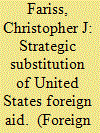

|
|
|
|
|
| Publication |
2010.
|
| Summary/Abstract |
I present a foreign policy decision-making theory that accounts for why US food aid is used strategically when other more powerful economic aid tools are at the disposal of policymakers. I focus my analysis on US food aid because this aid program provides an excellent case with which to test for the existence of foreign policy substitution. Substitution is an important assumption of many foreign policy theories yet proves to be an allusive empirical phenomenon to observe. Central to this analysis is the identification of legal mechanisms such as the ''needy people" provision in the US foreign aid legislation that legally restrict certain types of aid; this mechanism, however, does allow for the allocation of certain types of foreign aid, such as food aid, to human rights abusing regimes. Thus, I test if food aid is used as a substitute for human rights abusing states while methodologically accounting for other aid options. The empirical results, estimated with a multinomial logit and Heckman model, demonstrate that countries with high levels of human rights abuse are (i) more likely to receive food aid and (ii) receive greater amounts of food aid even when controlling for other economic aid, the conditioning effect of strategic interests and humanitarian need over the period 1990-2004.
|
|
|
|
|
|
|
|
|
|
|
|
|
|
|
|
| 8 |
ID:
103901
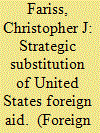

|
|
|
|
|
| Publication |
2010.
|
| Summary/Abstract |
I present a foreign policy decision-making theory that accounts for why US food aid is used strategically when other more powerful economic aid tools are at the disposal of policymakers. I focus my analysis on US food aid because this aid program provides an excellent case with which to test for the existence of foreign policy substitution. Substitution is an important assumption of many foreign policy theories yet proves to be an allusive empirical phenomenon to observe. Central to this analysis is the identification of legal mechanisms such as the ''needy people" provision in the US foreign aid legislation that legally restrict certain types of aid; this mechanism, however, does allow for the allocation of certain types of foreign aid, such as food aid, to human rights abusing regimes. Thus, I test if food aid is used as a substitute for human rights abusing states while methodologically accounting for other aid options. The empirical results, estimated with a multinomial logit and Heckman model, demonstrate that countries with high levels of human rights abuse are (i) more likely to receive food aid and (ii) receive greater amounts of food aid even when controlling for other economic aid, the conditioning effect of strategic interests and humanitarian need over the period 1990-2004.
|
|
|
|
|
|
|
|
|
|
|
|
|
|
|
|
|
|
|
|
|